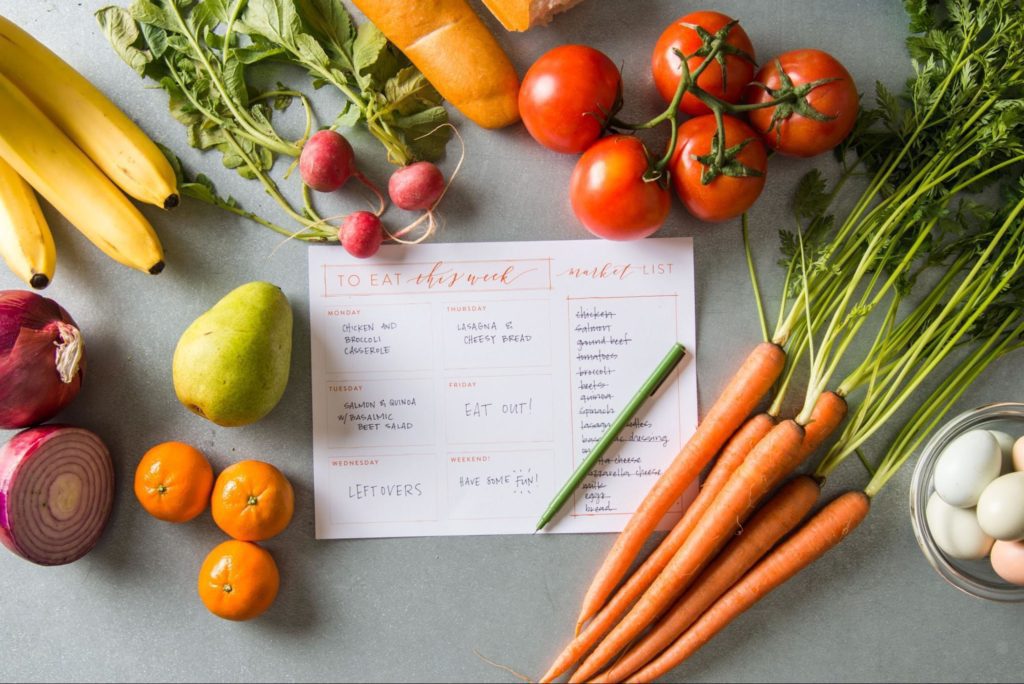A 5 Minute Guide to Healthy Meal Planning

 When you’re rushing through a busy day, your diet may be the last thing on your mind. Maybe you grab a doughnut during a morning meeting, buy lunch from a vending machine, and pick up a bucket of fried chicken for dinner because you’re too tired to cook.
When you’re rushing through a busy day, your diet may be the last thing on your mind. Maybe you grab a doughnut during a morning meeting, buy lunch from a vending machine, and pick up a bucket of fried chicken for dinner because you’re too tired to cook.
If you think you don’t have time for meal planning, think again! Figuring out what you’re going to eat in advance can actually make it more convenient to eat healthy. Plus, you’ll probably spend less on groceries and dining out.
Put your diet back on track. Take a look at these tips for taking control of meal planning.
Dealing with the Logistics of Meal Planning
1. Schedule by the week. Unless you have a personal chef, it will probably be easier to design your meal plans for several days at a time. That way, you can cook in batches, and make fewer trips to the supermarket. A week at a time is a good starting point.
2. Divide up your servings. If you’re trying to lose weight, calculate how many calories you need per day. Then, you’ll know about how much to eat for each meal and snack.
3. Shop mindfully. Focus on the perimeter of the supermarket where you’re more likely to find fresh whole foods instead of candy and chips. Visit farmer’s markets and ethnic stores to experiment with exotic ingredients that will add variety to your table.
4. Stock your pantry. Are exciting recipes passing you by because you’re out of tahini or pink salt? Make a list of products you want to keep on hand.
5. Clear away junk food. Make room for healthy fare by minimizing products that are high in sugar, salt, and empty calories. If you want to hold on to a few cookies, store them out of sight.
6. Ask for support. Invite your family and friends on board. Shopping and preparing meals is more fun when you have company. Even small children can suggest what side dishes to serve, and help with kitchen tasks like tearing up salad greens.
7. Be flexible. While a meal plan is likely to make your diet more balanced, there will be days when you slip up. Congratulate yourself for making sound choices most of the time.
Meeting Your Nutritional Needs with Meal Planning
1. Load up on produce. Fill at least half your plate with vegetables and fruits. Aim for 5 to 13 servings a day. Most fresh or frozen produce is high in nutrients and low in calories.
2. Choose healthy fats. Most adults need about 30% of their calories from fat. Good choices include olive oil, nuts, seeds, and fatty fish.
3. Create substitutes. Almost any dish can be made lighter. Browse online or pick up a cookbook that will give you helpful ideas. You may find that you like baked tofu with barbecue sauce just as much as fried chicken.
4. Carry snacks. Snacks are part of your meal plan too. Keep a jar of natural peanut butter in the office refrigerator. Pack a cooler with yogurt and whole grain cereal for road trips.
5. Learn to read labels. Labels provide a great deal of useful information when you know how to interpret the numbers. Check how many calories you’re consuming, and the percent daily values for minerals, vitamins, and fiber.
Whether you enjoy gourmet cooking or barely know how to operate your microwave, there’s a meal plan that will suit your lifestyle and health needs. As your new eating behaviors become automatic, you’ll find it easier to maintain a healthy weight while enjoying delicious foods.
CLICK HERE to Explore Our Free Online Courses


Responses